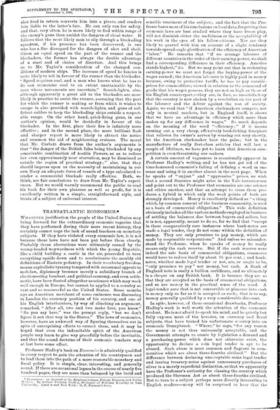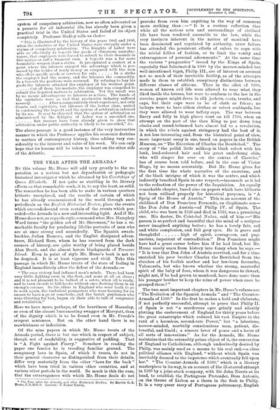TRANSATLANTIC ECONOMICS.* WHATEVER justification the people of the United States
may bring forward for the extraordinary economic vagaries that they have performed during their more recent history, they certainly cannot urge the lack of sound teachers on monetary subjects. If they have violated every economic law, it is not because these laws have not been put before them clearly. Probably these aberrations were ultimately caused by the wrong-headed waywardness with which the young Republic, like a child building a castle in the air, proceeded to turn everything upside down and to revolutionise the mouldy old definitions of Eastern pedantry. In their vocabulary freedom means capitalistic tyranny tempered with occasional appeals to mob-law, diplomacy becomes merely a subsidiary branch of electioneering bombast, and political economy, and even arith- metic, have been flouted altogether as sciences which may work well enough in Europe, but cannot be applied to a country so vast and so resourceful as the United States. Some months ago an American merchant of some eminence was discussing in London the currency position of his country, and one of his English interlocutors, by way of clinching an argument, remarked, "After all, two and two make four, you know." "So you say here," was the prompt reply, "but we don't figure it out that way in the States." The laws of economics, however, have an awkward way of figuring themselves out in spite of enterprising efforts to correct them, and it may be hoped that even the indomitable spirit of the American people may learn to give way gracefully before the inevitable, and that the sound doctrine of their economic teachers may at last have some effect.
Professor Hadley's book on Economics is admirably qualified in every respect to gain the attention of his countrymen and to lead them into the path of a more reasonable monetary and fiscal policy. It is simple, clear, interesting, and generally sound. If there are occasional lapses in the course of nearly five hundred pages, they are more than balanced by the lucid and
• Economics: en Account of the Relations between Private Property and Public Welffr.e. By Arthur Paining Hadley, Professor of Political Economy in Yale Uniseriity. Londin and New York ; G. P. Pnlnam's Bone. sensible treatment of the subject ; and the fact that the Pro- fessor bases most of his conclusions on local data, forgetting that economic laws are beat studied where they have freest play, will not diminish either the usefulness or the acceptability of his work in the eyes of his fellow-citizens. Nor are they likely to quarrel with him on account. of a slight tendency towards spread-eagle glorification of the efficiency of American "labor." He remarks that "if we arrange laborers of different countries in the order of their earning-power, we shall find a corresponding difference in their efficiency. America stands highest," ..tc. But we may point out that in reckoning earning-power we must not forget the buying-power of the wages earned ; the American labourer is highly paid in money because, owing to protective tariffs, he has to pay outside- prices for commodities; viewed in relation to the command of goods that his wages possess, they are not so high as those of his English counterpart, —they are, in fact, so unsatisfactory that the country is now shaken by a revolution on the part of the labourer and the debtor against the rest of society. Again, we read that " if American clockmakers compete, not only in neutral markets, but in England itself, it shows that we have an advantage in efficiency which more than makes up for any difference in wages." So much depends on the meaning of the word " efficiency ; " if it means turning out a very cheap, offensively loud-ticking timepiece that relieves its owner's nerves by wearing out very shortly. let the American clockmaker bear the palm; but in the manufacture of really first-class articles that will last a couple of lifetimes, we have yet to learn that American com- petition is even threatening our makers.
A certain amount of vagueness is occasionally apparent in Professor Hadley's writing, and he has not got rid of the time-honoured economist's failing of defining a word in one sense and using it in another almost in the next page. When he speaks of "unjust" and " oppressive " prices, we wish that a second Socrates might arise in the Yale lecture-room and point out to the Professor that economics are one science and ethics another, and that an attempt to cross them pro- duces a hybrid in which only the weak points of both are strongly developed. Money is excellently defined as " a thing which, by common consent of the business community, is used as a basis of commercial obligations." This wide definition obviously includes all the various methods employed in business of settling the balances due between buyers and sellers, but it is not, apparently, meant to do so, for we find that "except in these comparatively rare instances where bank-notes are made a legal tender, they do not come within the definition of money. They are only promises to pay money, which are made by responsible corporations." And unless we misunder- stand the Professor, when he speaks of money he really means only the cash reserve. But if the cash reserve were indeed the sole basis of commercial obligations, commerce would have to reduce itself by about 95 per cent. ; and bank- notes, whether made legal tender or not, are, or ought to be, "only promises to pay" not money, but cash. A Bank of England note is really a bullion certificate, and so ultimately is a cheque on any British bank. It is because they are so that they are accepted as the basis of commercial obligations, and so are money in the practical sense of the word. A legal-tender note that is not convertible at pleasure into cash is money only so far as it is accepted as such; that is to say, money generally qualified by a very considerable discount.
In spite, however, of these occasional drawbacks, Professor Hadley's work is well worth the attention of the economic student. He is not afraid to speak his mind, and he quietly but fully exposes most of the heresies, on currency and fiscal subjects, that have turned his unfortunate country into an economic Donnybrook. " Where," he says, "for any reason the money is not thus universally acceptable, and the Government attempts to create by legislation a demand and a purchasing-power which does not otherwise exist, the opportunity to declare a coin legal tender is apt to be abused. Such abuse is most common and flagrant in com- munities which are about three-fourths civilised." But the difference between declaring unacceptable coins legal tender and issuing treasury-notes against unnecessary purchases of silver is a merely superficial distinction, so that we apparently have the Professor's authority for classing the country which produced the Sherman Act as about three-fourths civilised. But to turn to a subject perhaps more directly interesting to English readers—many will be surprised to hear that the
system of compulsory arbitration, now so often advocated as a panacea for all industrial ills, has already been given a practical trial in the United States and failed of its object
completely. Professor Hadley tells us that-
" This is illustrated by the history of the years 1885 and 1836, when the industries of the United States were virtually under a regime of compulsory arbitration. The Knights of Labor were able so effectually to boycott the goods of obnoxious manufac- turers, that employers were forced to submit to their demands in this matter or suffer financial ruin. A boycott was a far more formidable weapon than a strike. It precipitated a contest at a point where the laborers enjoyed the advantage which is pos- sessed by the holder of ready money as compared with the man
who offers specific goods or services for sale In a strike the employer had the money, and the laborers the commodity. In a boycott the positions were reversed. By refusing to buy his goods the laborers attacked the employer at his weakest point. Cut off from his markets, the employer was compelled to submit the disputed matters to arbitration. Yet the result was by no means advantageous to laborers as a class. The hands of the capitalists were so tied that productive industry suffered severely After a comparatively short experience, not only Courts and capitalists, but laborers of the better class, united in condemning the boycott and the system of arbitration enforced by its use. It may be objected that the system of arbitration as administered by the Knights of Labor was a one-sided one. But reasons have teen already given to show that arbitration under public authority is likely to be one-sided," &c.
The above passage is a good instance of the very instructive manner in which the Professor applies his economic doctrine to matters of contemporary history, thus adding very con- siderably to the interest and value of his work. We can only hope that its lessons will be taken to heart on the other side of the Atlantic.























































 Previous page
Previous page